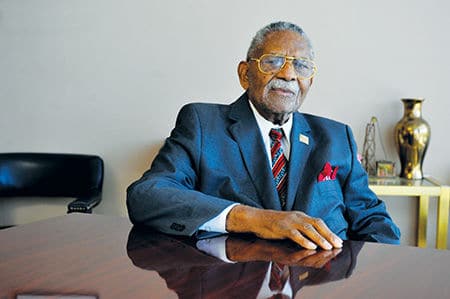If you read our profile last week of L. Clifford Davis, you know his background.
But I’ll summarize from Marice Richter’s story:
Davis, who turns 91 in October, has spent his lifetime advocating for fairness and civil rights, partly because he grew up in the South in the era of segregation and experienced racism first hand.
How did he experience this racism? He experienced it not only via the inequity of segregation but through the physical pain of being stoned by white children on his way to school as a youngster in rural Arkansas.
After graduating from Howard University in Washington, D.C., with a law degree, Davis came to Fort Worth in 1953. Here, he challenged segregation policies in the Mansfield and Fort Worth school districts and filed education equality lawsuits similar to Brown v. Board of Education of Topeka.
He’s had a long and distinguished legal career and continues to practice law daily with Johnson, Vaughn & Heiskell.
At our Power Attorney event on Sept. 24, Fort Worth Business honored Davis with a Special Recognition Award and he gave a speech that few in the room will forget. I’ll present it here as he delivered it:
In my career in what is commonly called the fight of civil rights I have given it a different name. I call it civil responsibility because I believe every human being is responsible and has a duty to work for the general welfare of the total population.
You know that was a part of the Constitution. The term general welfare is in the Declaration and our Constitution and I have tried to work for the general welfare of all the people.
Everybody’s attention in this country and this week has been on the visit of the Pope and I have listened to the remarks he has made with interest. Because there is such a parallel between some of the ideas he has expressed and some of the ideas expressed in our Constitution. Our Constitution talks about liberty and justice and freedom for all. It is an evolutionary process because it has been expanded – originally it did not extend to all. Now it has evolved to the point where it extends to all and we have been advocates for equal opportunity for education for progress for all people without regard to sex, race, ethnicity, or their socio-economic level. And I believe that is the duty of every individual to respect every other individual without regard to age, sex, race or socio-economic level. I believe that to be what I call civil responsibility. I hope all of us carry into our conversation civil responsibility in our private lives, in our homes, our workplace and those who of us that are public officials will carry that into public policy for the general welfare of the total population.
You could have heard a pin drop among the many attorneys and others in attendance at our event. And with good reason, Davis gave us a great summation of what all of us as citizens needed to hear. Some wisdom learned in the crucible of a life not just well-lived, but well examined as well.






